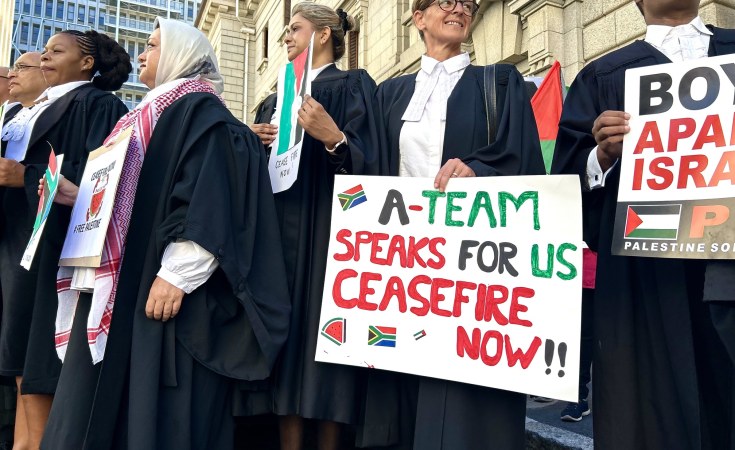Israel is being taken to court by South Africa over allegations of genocide. Here are the most important questions before proceedings get underway in The Hague.
South Africa is taking Israel to court for alleged genocide. In its application to start legal proceedings, South Africa claims that Israel's "acts and omissions ...are genocidal in character, as they are committed with the requisite specific intent ...to destroy Palestinians in Gaza as part of the broader Palestinian national, racial and ethnical group."
Both South Africa and Israel are members of the 1948 Genocide Convention. This international treaty obliges its signatories to prevent and punish the crime of genocide. Genocide is defined in the treaty as certain acts that are intended to destroy, in whole or in part, a national, ethnical, racial, or religious group.
According to the filing, the reason for South Africa's initiative is Israel's actions and threats against the Palestinian people following October 7, 2023. Israel declared war on the militant group Hamas, which is designated as a terrorist organization by the US, the European Union, Israel, and others, after Hamas killed around 1,200 people and took more than 200 hostages in an attack on Israel on October 7, 2023.
Since then, more than 20,000 Palestinians have been killed in Israel's bombardment of Gaza. The humaniatrian situation in Gaza has been deteriorating since the start of the conflict.
Israel says its military actions in Gaza are to destroy Hamas so that the state of Israel will be safe from the militant-Islamist group.
Which court is being called on?
South Africa initiated its proceedings at the International Court of Justice (ICJ) in The Hague on December 29, 2023. The ICJ is the top court of the United Nations (UN) and is sometimes also called the World Court.
Unlike the International Criminal Court (ICC), the ICJ does not deal with individual criminal responsibility, but with disputes among states. Starting this Thursday, January 11, 2023, the ICJ will hear from both countries.
What are the hearings about?
In the hearings, the ICJ will decide whether it will grant South Africa's request for provisional measures. These measures are a kind of emergency relief, which will apply while the case is pending, Michael Becker, Assistant Professor of International Human Rights Law at Trinity College in Dublin, told DW.
South Africa has asked the ICJ for several provisional measures. Among them is a request that Israel "shall immediately suspend its military operations in and against Gaza," as well as to not engage in acts of genocide, and to take reasonable measures to prevent it, but also to allow access for humanitarian assistance. South Africa also asks for regular reports to the ICJ on these measures.
Why is South Africa lodging the case?
In the 84-page-long application to the court, South Africa mentions "its own obligation -- as a State party to the Genocide Convention -- to prevent Genocide."
The country is a strong critic of Israel. For years, the ruling African National Congress (ANC) party has compared Israel's policies in Gaza and the West Bank with South Africa's past-apartheid regime of segregation, a comparison shared by the South African President Cyril Ramaphosa. Israel rejects these claims. South Africa's application to the ICJ also refers to this notion and speaks of a "background of apartheid" concerning Israel's treatment of the Palestinian people.
What does Israel say?
Israel firmly rejects the genocide allegations.
"Israel rejects with disgust the blood libel spread by South Africa and its application" to the ICJ, Israeli foreign ministry spokesman Lior Haiat wrote on X, formerly Twitter, in an early reaction.
The allegations were also dismissed by Israel's Prime Minister Benjamin Netanyahu and President Isaac Herzog.
On X, Herzog wrote that he emphasized in talks with US Secretary of State Antony Blinken that at the ICJ, "we will proudly [and] clearly present the fundamental right of Israel to defend itself."
Israel will participate in the hearings and send former Supreme Court Chief Justice Aharon Barak as judge.
Israel's decision to participate is "a good thing for international justice," international law expert Becker told DW.
In the past Israel has often decided not to take part in international proceedings, Becker said.
What could be the outcome?
The outcome of the preliminary proceeding is completely open. The court could decide for or against provisional measures or, in theory, even find that it is not in charge of the case.
Should the ICJ be in favor of provisional measures it would not have to follow the proposal by South Africa, but could also formulate its own measures, Becker explains. He expects that there is a strong case for the ICJ to order provisional measures, but doesn't expect them to be as far-reaching as some of the South African requests go.
With regards to South Africa's request to not impede on providing humanitarian assistance to the people in Gaza, Becker thinks "it is relatively likely that the court will direct Israel in some way or another to ensure that humanitarian assistance can reach Gaza in much [larger] quantities than is currently taking place."
The hearings will start on Thursday with South Africa. On Friday, the Israeli delegation will get a chance to make their statement. A decision on the request for preliminary measures is expected to be issued relatively quickly, possibly within a few weeks.
If the case moves to the next stage, a decision on its substance -- the question of whether Israel committed the alleged acts or not -- might take years.
Edited by: Carla Bleiker


